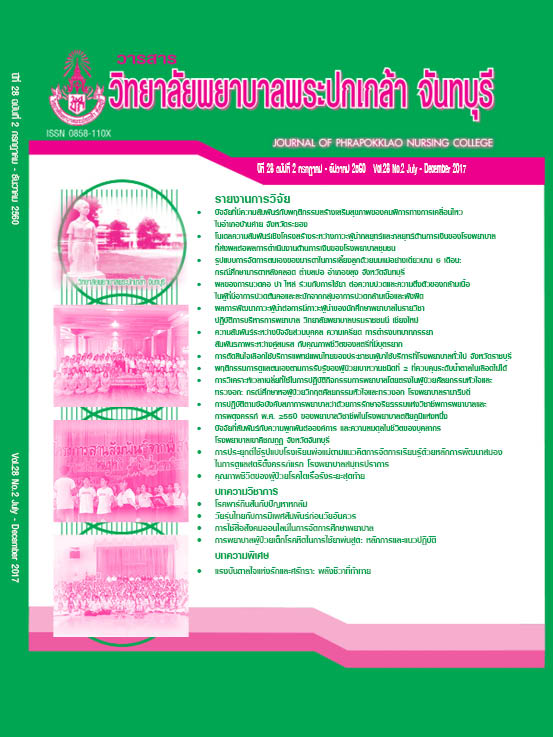Effects of Neck and Shoulder Massage Combined with Medication Use on Pain and Electromyogram Biofeedback in Persons with Neck and Scapular Pain Associated with Myofascial Pain Syndrome
Keywords:
Neck and shoulder massage, Pain, Muscle tension, Myofascial pain syndrome, Complementary therapyAbstract
This quasi-experimental research aimed to examine the effects of neck and shoulder massage combined with medication use on pain and electromyogram biofeedback in persons with neck and scapular pain associated with myofascial pain syndrome. The subjects were 75 persons who had neck and scapular pain associated with myofascial pain syndrome attending treatment at the out-patient department and the Thai traditional medicine health center at Donthum Hospital, Nakornpathom Province, equally devided into 3 groups:- medication only, massage combined with medication, and massage only. The research instruments were composed of a manual of Thai massage, a recording form of medication taking, a questionnaire of personal characteristics, an assessment form of pain score, and an electromyogram biofeedback device. The implementation and data collection were conducted from September to December, 2013. Statistics used for data analysis included frequency, percentage, mean, standard deviation, Wilcoxon signed ranks test, paired t-test, and one-way ANOVA.
The research results revealed that after the medication only, massage combined with medication, and massage only, the mean scores of pain were statistically significant decreased (z = 4.401, p < .001; z = 4.402, p < .001 and z = 4.408, p < .001, respectively), and the mean scores of electromyogram biofeedback were also statistically significant decreased (t = 8.655, p < .001; t = 5.662, p < .001 and t = 6.265, p < .001, respectively). In contrast, the mean difference scores of pain and electromyogram biofeedback in each group were not statistically significant different.
This research suggested that health care providers should promote Thai massage for patients with myofascial pain syndrome instead medication taking. Moreover, administrators should encourage for setting up Thai traditional medicine clinic in their own institutes. Additionally, right to treatment should be considered for simply access to service.
Downloads
Published
How to Cite
Issue
Section
License
เนื้อความ ข้อมูล และรายการอ้างอิงที่ผู้เขียนใช้ในการเขียนบทความเพื่อลงตีพิมพ์ในวารสารวิทยาลัยพยาบาลพระปกเกล้า จันทบุรี ถือเป็นความคิดเห็นและความรับผิดชอบของผู้เขียน คณะผู้จัดทำวารสารไม่จำเป็นต้องเห็นพ้องด้วยหรือร่วมรับผิดชอบ
บทความที่ได้รับการลงตีพิมพ์ในวารสารวิทยาลัยพยาบาลพระปกเกล้า จันทบุรี ถือเป็นลิขสิทธิ์ของวารสารวิทยาลัยพยาบาลพระปกเกล้า จันทบุรี หากหน่วยงานหรือบุคคลใดต้องการนำส่วนหนึ่งหรือทั้งหมดของบทความไปเผยแพร่ต่อเพื่อวัตถุประสงค์ใด ๆ จะต้องได้รับอนุญาตจากบรรณาธิการวารสารก่อน



